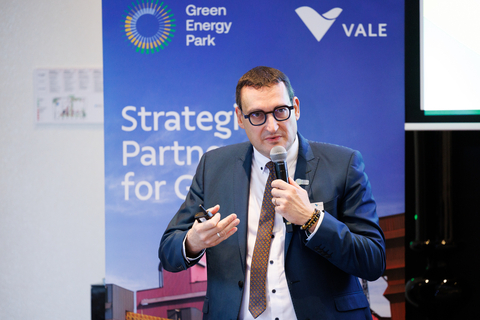Vale and Green Energy Park (GEP), an integrated European hydrogen company, have joined forces to deliver decarbonization solutions for the global steel sector. Through this partnership the companies will work on feasibility studies to develop a green hydrogen production facility to supply a future Mega Hub in Brazil, an industrial complex aimed at manufacturing low-carbon steel products. This joint initiative can provide an open platform for international partnerships in which global steel companies can source and produce hot-briquetted iron (HBI) in Brazil and accelerate the emerging low carbon steel industry.
This press release features multimedia. View the full release here: https://www.businesswire.com/news/home/20241001836859/en/

Bart Biebuyck, CEO of Green Energy Park (Photo: Business Wire)
Vale has been actively seeking partners to enable the construction of Mega Hubs in Brazil, aligned with its strategic objective to foster the country’s low-carbon industry. In these industrial hubs, Vale expects to produce iron ore agglomerates (pellets or briquettes), which will serve as an input to produce HBI (a low-carbon emission steel pre-material) with renewable hydrogen as the reducing agent. The agreement with GEP is another important step in this direction.
“This is a win-win partnership for Brazil and Europe”, says Ludmila Nascimento, Director of Energy and Decarbonization at Vale. “We are leveraging Brazil's competitive advantages, such as high-quality iron ore and abundant renewable energy, to potentially develop green hydrogen supply, which will enable the offer of a “green” HBI with high added value to European steelmakers. Meanwhile, we are fostering Brazil's new industrialization, based on the low-carbon economy, and contributing to the fight against climate change”.
“The partnership with Vale is a major milestone on our journey to Net Zero. We are proud to work with the largest producer of direct reduction pellets in the world to help decarbonize the steel sector. The collaboration between our companies aims to bring our leading green hydrogen technology to the core of the hard-to-abate sectors, offering a highly competitive platform for green steel production in Europe and around the world,” comments Bart Biebuyck, CEO of GEP. “Together, we are looking forward to accelerating the green hydrogen industry in Brazil.”
The iron and steel industry accounts for approximately 8% of the world’s total carbon emissions, primarily due to the use of coal in blast furnaces. High carbon emissions by the steel industry represents a big challenge for global efforts to reduce greenhouse gas emissions and reach a carbon neutral economy by 2050.
For every ton of steel produced in blast furnaces about 2.0 tons of CO2 equivalent are released into the atmosphere. In contrast, in the direct reduction route, the HBI produced with green hydrogen as the reducing agent when supplied to Electric Arc Furnaces (EAFs), reduces carbon emissions to approximately 0.4 tons of CO2 equivalent per ton of steel produced, accounting for all emissions along the value chain. This process therefore results in an 80% reduction in emissions, enabling “green steel” production.
Vale and GEP, which is supported by Europe’s Global Gateway program, will also collaborate on various aspects of the hydrogen value chain, such as the deployment of electrolysers, the design of industrial plants for green hydrogen and its derivates, as well as other industrial decarbonization applications of renewable hydrogen.
To drive down the costs, Green Energy Park will implement state-of-the-art electrolyser technologies on a standardized production platform. The integrated hydrogen production plant by Green Energy Park features some of the most advanced process engineering designs, including storage and handling facilities for hydrogen and its derivatives. As such, GEP contributes deep engineering and EPC (Engineering, Procurement and Construction) expertise in the field of world-scale cryogenic gas handling and storage, combined with dedicated infrastructure and industrial construction capabilities.
About Green Energy Park
Green Energy Park is an integrated hydrogen company, implementing one of the largest climate impact undertakings in the world. The company’s objective is to design, build, and operate hydrogen production infrastructure with ammonia and methanol the long-distance renewable energy carriers of choice. As a molecule’s specialist, and to achieve cost leadership, GEP implements leading hydrogen technologies on its standardized production platform at the gigawatts scale. Green Energy Park's mission is to accelerate the energy transition and make the hydrogen economy a reality.
About Vale
Vale is a global mining company that exists to improve lives and transform the future together. One of the world's largest producers of iron ore and nickel and a major copper producer, Vale is headquartered in Brazil and operates around the world. Its operations comprise integrated logistics systems, including approximately 2,000 kilometers of railways, marine terminals and 10 ports distributed around the globe. Vale has the ambition to be recognized by society as a benchmark in safety, the best-in-class reliable operator, a talent-driven organization, a leader in sustainable mining, and a benchmark in creating and sharing value.
View source version on businesswire.com: https://www.businesswire.com/news/home/20241001836859/en/
Contact details:
VALE
General Enquiries:
Daniel Kaz, Media Relations Office
[email protected]
GREEN ENERGY PARK
General Enquiries:
Loreta Pacipaviciute, Media Relations Office
[email protected]
Investor Relations:
Mario Reinisch, CFO
[email protected]

